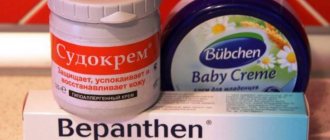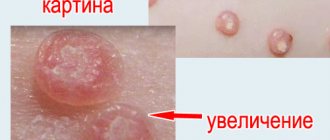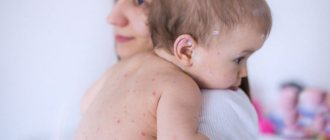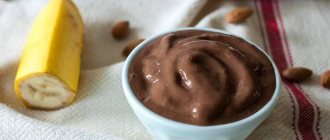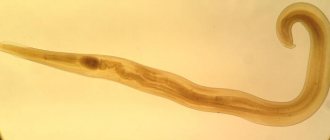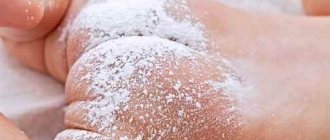Cause of ear odor in infants
Most young mothers note that babies in the first months of life have their own special, incomparable aroma of cleanliness and breast milk.
Any changes in it should alert parents, as they may indicate some kind of disorder in the baby’s body. One of the common problems is an unpleasant odor from the ear of a baby.
Let's look at the main reasons for its occurrence and ways to eliminate it, as well as situations that require immediate medical attention.
External factors
Unpleasant odor from a child’s ear can be caused by various factors.
In most cases, unpleasant odor from a child’s ear is due to reasons not directly related to the hearing organ. External factors of this phenomenon include:
- Failure to comply with hygiene rules. Pediatricians do not recommend overly thorough sanitation of the ear canals of newborn babies, especially using cotton swabs and other hard objects. Many young mothers, fearing damage to the baby's delicate eardrum, take this advice literally and do not pay due attention to cleaning the ears.
- Fluid getting into the ear. Water remaining in the ear canal after bathing does not itself usually cause a change in odor. The most common cause of the disorder is frequent regurgitation, which leads to the flow of a small amount of stomach contents into the ears. This is facilitated by prolonged exposure to a horizontal position, improper attachment to the breast, or the use of inappropriate artificial formula for feeding. In this case, a strong unpleasant sour odor appears from the child’s ear.
- Prickly heat. Newborns have an imperfect mechanism for thermoregulation and often sweat not only as a result of overheating, but also while eating or sleeping. Sweat accumulates in large and small folds of the skin, including behind the ears, leading to a sour odor.
- Allergic reaction. An unpleasant odor from a child's ear may appear as a result of the formation of weeping crusts that form as a result of skin rashes. Allergies are most often caused by an incorrectly selected formula, a violation of the diet of a nursing mother, the introduction of complementary foods, or the use of certain cosmetics and washing powders. If there is redness on the skin and itchy rashes around the ears, we can also talk about the development of dermatitis or diathesis.
Allergies can cause ear problems
Internal factors
In some cases, various pathological processes occurring directly in the ear cavity can lead to the appearance of an unpleasant odor:
- A foreign object stuck in the ear canal, complicating the natural drainage of sulfur secretion. Sometimes the formation of wax plug can lead to blockage. Any foreign body often becomes a source of infection, causing pain and discomfort.
- An inflammatory process, most often otitis media, an abscess of the outer ear or fungal infections of the ear canal. Pathogenic microorganisms can penetrate different parts of the ear in different ways. Due to the imperfect immune system and the physiological characteristics of the structure of the hearing organs in young children (short and wide Eustachian tube), the infection easily penetrates from the nasopharynx into the middle ear, causing inflammation. Therefore, otitis media most often occurs against the background of colds or in the presence of a chronic source of infection (caries, sinusitis, tonsillitis).
You should not ignore the appearance of an unpleasant odor from the ear, as this may be a symptom of otitis media.
Other factors that provoke the development of otitis media and unpleasant odor from the ear in babies include:
- predisposition to allergies;
- using a pacifier;
- contact with other children or sick adults;
- unbalanced diet, lack of vitamins (mainly A and group B);
- passive smoking and low standard of living.
Infectious-inflammatory and fungal diseases of the outer ear are often associated with bruises, injuries, and foreign objects. The main symptoms of the listed pathologies in infants include:
- a sharp increase in temperature to 38 ° C and above;
- deterioration of general health, lethargy, drowsiness, loss of appetite;
- pain in the ear (the baby is capricious, often cries, shakes his head or rubs his ears).
When the outer ear is affected, foci of inflammation, abscesses or redness of the skin, and severe swelling are visible. A fungal infection is always accompanied by severe itching and a grayish-white or yellowish coating.
Ways to solve the problem
Let's consider what to do if a child has an unpleasant odor from the ears due to external factors. Usually this phenomenon is short-term in nature and disappears without a trace if the listed recommendations are followed.
Carrying out hygiene measures
Ears should be cleaned regularly
First of all, it is necessary to sanitize the outer part of the ears and the skin around the ears. To do this, use a cotton pad or swab moistened with boiled water.
In case of severe contamination, visible to the naked eye, you can clean the ear canals using cotton wool. It is not allowed to insert them deeper than 0.5 cm.
For children older than 3-4 months, it is allowed to use cotton swabs with a limiter.
Hygienic procedures should be carried out at least 2 times a week. After each bath, it is necessary to thoroughly dry the baby's ears to prevent possible water from flowing into the ear canal.
Prevention of allergies and regurgitation
To prevent unpleasant odor from the ears of a baby, the following recommendations must be followed:
- correctly attach the baby to the chest, making sure that his head is higher than his body;
- after breastfeeding or formula feeding, carry the baby in an upright position for at least 10 minutes to effectively remove gases from the stomach;
- select an artificial formula in accordance with the pediatrician’s recommendations and the individual characteristics of the baby;
- put the baby to sleep on a hard orthopedic mattress without a pillow;
- dress the baby according to the weather, avoid overheating;
- carefully introduce new foods into the diet of a nursing mother and child; if signs of intolerance appear (itchy skin rashes, intestinal upset), exclude the allergen from the menu;
- Use only hypoallergenic baby hygiene products, cosmetics and washing powders.
It is very important to put your baby to the breast correctly when feeding
When medical attention is needed
If, despite the preventive measures taken, the baby’s ear smells bad, we can talk about the development of a pathological process. In this case, you should contact a pediatrician or otolaryngologist to determine the exact cause of the disorder and take the necessary measures.
Important! Due to the peculiarities of the anatomy of the hearing organs, young children very quickly develop dangerous complications, leading to serious consequences, including deafness and death. Self-medication or uncontrolled use of medications without a doctor’s prescription is unacceptable.
If you experience pain or discharge from the ear, seek immediate medical attention.
Immediate medical attention is required in the following cases:
- Pain syndrome. To confirm the presence of pain and discomfort, you need to press on the tragus, which is a small protruding cartilage next to the auricle on the side of the cheek. The manipulation should be carried out on both sides. As the pathology develops, the baby begins to cry and worry.
- A sharp deterioration in health and the addition of other symptoms. Increased temperature, apathy, nausea, vomiting, diarrhea, poor coordination of movements, and convulsions indicate an acute infection. In the absence of timely treatment, severe complications can develop, including sepsis and cerebral edema.
- The appearance of purulent, bloody or mucous discharge from the ear canal. The appearance of fluid may indicate a ruptured eardrum. Before the doctor arrives, it is prohibited to use any drops or rinse the ear, as this will lead to damage to the auditory nerve and deafness.
- Skin rashes and itching of unknown etiology. This can be a symptom not only of dermatitis or allergies, but also of many infectious diseases.
- A foreign object or wax plug in the ear canal. Do not attempt to remove a foreign body using tweezers, cotton swabs, or rinsing with water and hydrogen peroxide. If you can’t remove it with your fingers, you can lay the baby on its side; sometimes small objects fall out on their own.
Source: https://nosoglot.ru/pahnet-iz-uha-u-grudnichka/
Prevention measures
To prevent unpleasant odor behind the ears, you should follow these recommendations:
- Maintain hygiene. Clean the ear canals with cotton wool once a week; the rest of the time, wash your ears with your fingers moistened with soapy water.
- Change your pillowcase often, especially with otitis media and colds.
- Make sure that dirty water does not get into your ears, which can cause otitis media.
- For diseases of the nasopharynx, start treatment in a timely manner and follow all recommendations of the attending physician. It is worth remembering that the ENT organs are interconnected and inflammation of one of them often leads to diseases of the others.
At the first symptoms of otitis media, you should consult a doctor. You should not self-medicate, as the condition may worsen sharply.
An unpleasant odor behind the ears can be the result of a fungal or bacterial disease. To get rid of this unpleasant symptom, it is necessary to use antimycotic drugs of local and systemic action. Traditional recipes help well; it is advisable to alternate or combine them.
Unpleasant odor from a child’s ear: causes and solutions
Some parents notice odor from their child's ear from time to time.
Such a manifestation can be completely harmless and go away on its own, but sometimes the cause is external influences on the body or processes outside the hearing organs.
You should be wary if you have concerns about the development of inflammation. In this case, immediate medical consultation will help avoid many negative consequences.
Solutions to the problem
Depending on what causes your child to have a specific ear odor, treatment for this symptom may vary dramatically. First, we should consider more common and relatively harmless situations associated with external influences.
If vomit gets into the ear, it is necessary to establish the principle of feeding the baby. You need to hold the baby in your arms, but not place it strictly in a horizontal position. After finishing feeding, hold him in the posture position and lightly pat him on the back. The baby will vomit air and food particles. After this, you can put him in his crib.
If skin redness and rash are detected, allergies or heat rash should be suspected. Be sure to provide air access to the skin of the ears. To prevent rotting, powder and special ointments are used.
Herbal decoctions, such as chamomile, sage or string, are also used to relieve swelling. Eliminate your baby's contact with allergens and adjust his diet.
Nursing mothers need to pay attention to their menu.
Any actions must be coordinated with the pediatrician, since inexperienced parents can harm the child by self-medicating.
If the smell is unpleasant enough to suspect suppuration, a visit to an ENT specialist is essential. The doctor will determine the cause of inflammation and its type, and also prescribe the necessary medications. The situation is complicated by the fact that many medications are contraindicated for use before a certain age.
Often young children are worried about an infection or fungus that was introduced when a foreign object entered the ear canal. It is necessary to limit the child’s contact with small objects and monitor the hygiene of his ears. For treatment, you need to use special drugs aimed at destroying the causative agent of the disease. Also take care of strengthening your baby’s immunity.
To restore health after antibiotic treatment, it is necessary to provide the child with sufficient amounts of nutritious food. Pay special attention to natural teas and compotes, fruits and vegetables.
The lack of vitamins and minerals can be partially compensated by introducing these elements into the diet of a nursing mother.
For bottle-fed babies, fortified cereals and milk formulas are selected.
To prevent the problem from reoccurring, you need to take care to comply with sanitary standards and hygiene, eat proper nutrition, walk in the fresh air more often, and also prevent infection from entering the body.
This includes taking care of the health of all family members. With proper treatment, it is possible to restore the normal condition of the baby’s ears in a short time.
Therefore, we strongly recommend not to self-medicate, but to consult a specialist for advice.
Source: https://bezotita.ru/simptomy/zapah-iz-uha-u-rebenka.html
Parents, don't worry! Odor from a child's ear is not always a problem
There are situations in which parents notice an unpleasant odor from the child’s ear. Most often, there is concern about the baby’s condition.
However, this situation may be normal and go away on its own. But there are also situations where the cause of ear odor can be external irritants or diseases of the inner ear.
Causes
Normally, a healthy person's ears should not smell. If there is even a slight odor, this indicates an imbalance in the body or some kind of disease.
- Metabolic disease .
It is directly related to changes in thyroid function. Violations can also occur due to lack of a balanced diet or poor lifestyle. For example, fasting or overeating, a sedentary lifestyle. - Adolescence can trigger the appearance of odor, as hormonal changes in the body .
- Fungal diseases caused by staphylococcus, streptococcus. The causes of this disease can be bruises and disruption of the ear microflora.
The disease is easy to recognize; a person experiences itching, pain, swelling, decreased hearing, plaque or discharge from the ear, and high fever.If such serious symptoms occur, you should immediately contact a specialist. After all, it is quite difficult to cure bacteria such as staphylococcus.
- Myringitis is an inflammation of the eardrum, which is accompanied by significant hearing loss. This disease can be caused by complications from the flu, as well as injury to the outer ear.
As the disease develops, blisters filled with fluid form. When treated, they burst and fluid is released into the outer ear area, which causes an unpleasant smell of rot.When myringitis occurs, a person experiences shooting pains, discharge from the ear canal, and a slight decrease in hearing.
In any case, if you suspect such a disease, you should contact an otolaryngologist, since only he will be able to examine the integrity of the eardrum and prescribe the right solution.
- Earwax occurs when earwax accumulates in large quantities in the ear canal. This leads to the spread of bacteria and unpleasant odors.
- Colds of the ears. When they form boils, which burst during the process of ripening and pus is released, which gives an unpleasant rotten smell.
- Otitis externa and otitis media can cause odor.
Children under 10 years of age are more often susceptible to otitis, since their ear structure is different from that of adults, and bacteria easily enter there. Lingering inside the ear, under the influence of heat they begin to multiply intensively, which leads to inflammation. It is accompanied by severe pain in the ear and increased temperature. In this case, you should definitely contact an otolaryngologist to make an accurate diagnosis and prescribe treatment.
In a baby
The origin of odor from a baby’s ear can be different. Most often, the appearance of odor is not associated specifically with the organ of hearing. However, it also happens that an inflammatory process occurs.
- Lack of baby ear care.
Perhaps the most common occurrence. Pediatricians warn young parents that they should clean their children’s ears carefully and without using cotton swabs or other objects. As a result, many young mothers are simply afraid of harming their baby, and therefore ignore ear cleaning or simply refuse it. - The presence of fluid in the child's ears .
If this happens during bathing, then, as a rule, there is no smell. However, there are times when breast milk or formula gets into the baby's ears through regurgitation. This happens due to improper attachment of the baby to the breast, as well as when the baby is constantly in a horizontal position. When this situation occurs, a sour smell of milk is felt from the ear. In order to get rid of it, it is necessary to normalize breastfeeding and remember to carry the baby in an upright position until belching occurs. - Smell from sweat . Breasts sweat often. Moreover, this happens not only due to overheating, but also when eating. Sweat accumulates in the folds of the newborn, as well as behind the ears, and therefore an unpleasant odor occurs.
- The presence of a foreign body in the ear canal.
A foreign body makes it difficult for the wax to pass away and a plug may form. As a rule, in such a situation there will be not only an unpleasant odor from the ear, but also anxiety for the baby due to discomfort and the development of infection. It is difficult to determine this, since the baby is still small and will not be able to inform his parents about this. - Ear diseases. This could be otitis media or external, various fungal diseases of the ear canal.
The newborn's immunity is still in its development stage. Therefore, any viruses and bacteria easily enter the body through the nasopharynx, causing inflammation of the middle ear.Fungal infection in babies is most often caused by candidiasis and is visible to the naked eye. Looking into the ear canal you can see redness, swelling, and a yellow coating.
At the same time, the baby may have a fever, he will be lethargic, and he may also constantly touch and rub his ears.
- An unpleasant odor may appear due to poor nutrition , namely a lack of vitamins A and B.
- Allergic reactions .
It is very common for newborns to have food allergies. In this case, crusts form throughout the body, and they can also appear behind the ears. Such formations become wet and an unpleasant odor appears. To avoid them, you need to choose the right formula, and if you are breastfeeding, then follow a diet.
Having examined the causes of unpleasant odor in newborns, we can conclude that you can get rid of it at home simply by following the feeding rules and carrying out hygiene procedures in a timely manner.
However, if you suspect a disease of the ear canal, you should consult a specialist. Since incorrect or lack of treatment for otitis and fungal infections can lead to serious consequences, such as deterioration or loss of hearing.
In older children
As a rule, the culprit of unpleasant ear odor in older children can be the same as in babies, but there are also some peculiarities.
- An unbalanced diet leads to a lack of vitamins - this can cause an unpleasant odor.
Many older children begin to neglect sweets, fast food, soda, chips and other unhealthy foods. - Lack of hygienic measures for cleaning ears. When parents lose control of their children, they simply forget to clean their ears.
- infections can occur in older children.
- Colds with the appearance of purulent pimples.
- Age-related features in which the secretion glands malfunction. This phenomenon provokes an increase in the amount of earwax, which causes the odor.
Conclusion
To get rid of odor from the ears, it is first necessary to determine the cause of its occurrence and only then begin treatment. In any case, you should be wary of the smell from your ears, and do not put off a visit to the otolaryngologist.
Only a doctor will be able to identify the correct cause of the unpleasant odor and prescribe the right treatment that will quickly and effectively relieve the child of odor from the ears.
Source: https://dr-lor.com/uho/simptomy/zapah-u-rebenka.html
How to get rid of odor behind the ears
If your ears stink, then, first of all, you need to find out the reason for this phenomenon. To do this, you should contact an otolaryngologist or therapist and undergo a full examination. If the disease is caused by bacteria or fungi, the following medications are prescribed:
- Clotrimazole, Pimafucin and Miconazole. These drugs are prescribed for fungal diseases.
- For fungal infections of the ear canal, it is advisable to use antifungal drops - Clotrimazole.
- Antimycotic ointments prevent an increase in the population of pathogenic fungi and promote rapid recovery. Preference is given to Pimafucin or Clotrimazole.
- If the stench behind the ears is accompanied by dandruff, then we can talk about a fungal infection of the skin and hyperfunction of the sebaceous glands. To eliminate the problem, the patient is recommended to wash his hair with Ketonazole or Sebazole shampoo.
- Antiseptic drugs – Miramistin, Amukin, Xeroform.
For a confirmed bacterial infection, both systemic and local antibiotics may be prescribed. When treating with antibacterial and antimycotic drugs, it is important to follow the doctor’s recommendations, not to exceed the dosage and not to change the duration of the course of treatment on your own.
If side effects occur while using any medications, you must inform your doctor. In this case, the treatment regimen is adjusted.
Child's ear smells
An unpleasant odor from a child’s ear can be caused by both an inflammatory process in the ear and a lack of hygiene.
Parents, when carrying out daily bathing and toileting of the child, should not forget that in the area behind the ear, as well as in other large folds, the products of sweat and sebaceous glands and desquamated epithelial cells can accumulate.
The behind-the-ear folds, which are not sufficiently accessible for visual inspection, may be filled with these waste products, which leads to the development of a certain odor from the child’s ear.
articles
Errors in care
For infants who remain in a horizontal position for a long time, insufficient hygienic care is the most typical mechanism for the development of this symptom.
As a result of regurgitation, the milk mixture flows into the area behind the ear and accumulates there.
With untimely and insufficient hygienic procedures, stagnation and souring of this product occurs with the formation of a putrid odor.
Thus, an unpleasant odor from the ear of a baby may be due to the accumulation of lactic acid products in the ear area. To avoid the development of such a symptom, it is recommended to feed the baby while holding him at an angle, with his head raised. It is this position of the baby that will also prevent the development of the inflammatory process in the auditory tube and middle ear.
Inflammation of the middle ear
The special type of feeding of newborns, as well as their anatomical features, are predisposing factors in the development of inflammation of the middle ear.
When feeding is done in a horizontal position, the risk of formula entering the Eustachian tube increases.
This can lead to stagnation in the auditory tube, its infection and, as a result, the development of inflammation of the middle ear.
Ear odor in a child caused by otitis media is the most dangerous cause of the development of this symptom.
Catarrhal inflammation is not accompanied by the presence of odor from the ear, and there is no exudate in the external auditory canal with this course of otitis. Purulent inflammation of the middle ear is characterized by the presence of fluid in the external auditory canal. In addition, a child may experience a characteristic unpleasant odor from the ear, the causes of which lie in the purulent nature of the exudate.
You can suspect purulent otitis media by the presence of additional signs:
- The general condition of the patient is impaired. The child is irritated, rushes about in bed, turns his head, screams;
- The patient refuses to eat;
- There is an increase in body temperature.
Considering that the smell from the baby’s ear began to be observed several hours or days after the onset of catarrhal symptoms, the reason for the development of this symptom becomes obvious. It consists in the development of complications of ARVI, inflammation in the ear.
At the same time, additional symptoms come to the fore and, above all, pain in the ear. Since the child, due to his age, cannot express complaints, an objective sign of the presence of pain syndrome is increased pain when pressing on the tragus.
As a result of such actions, the child screams. The presence of a combination of these signs is a reason to consult the child with an otolaryngologist in the near future.
Suppuration is an absolute indication for the prescription of antibiotics, both in the form of ear drops and systemic action.
Otitis externa
The postauricular area and external auditory canal are very suitable places for the development of an infectious process. The addition of a bacterial or fungal pathogen contributes to the development of external otitis in children.
In this case, in addition to some odor, swelling and redness of the lesion will attract attention. Peeling of the skin may occur. In addition, when touching the lesion, pain develops.
When otitis externa comes to the fore, a combination of various signs not related to lack of hygiene comes to the fore. In this case, consultation with an otolaryngologist is extremely necessary, since a fungal infection without proper treatment tends to spread.
Bacterial inflammation can be characterized by a significant impairment of the general condition.
Ear drops or ointments with an antibacterial and antifungal component can be offered as medications. The drug Candibiotic, which contains both components, can only be used in children over 5 years of age.
Allergy
Ear odor in an infant can also be caused by allergic processes or atopic dermatitis. When breastfeeding, the most likely reason for the development of this condition is the mother's consumption of harmful foods.
Penetrating into the baby's body as part of breast milk, these substances cause the development of a skin reaction. The affected area can be localized on the cheeks and scalp. The development of this pathology can be accompanied by cracks and weeping of the skin, which leads to the appearance of an unpleasant odor.
The addition of a secondary infection enhances the putrid odor.
These symptoms can also be caused by the development of prickly heat. Overdressing or swaddling your baby will cause your baby to overheat. Together with insufficient hygiene procedures, this can contribute to the development of this skin pathology. The area behind the ear may be somewhat hyperemic, swollen, and have pinpoint rashes.
Foreign body
A rather dangerous cause of ear odor is the presence of a foreign body in the ear. For newborn children, such an object may be a piece of cotton wool left there after hygiene procedures.
Its long-term presence in the external auditory canal in combination with earwax, as well as the addition of an infectious agent, can cause the development of bacterial inflammation and, as a result, unpleasant odor from the ear in a child.
Thus, the following pathological conditions may be the causes of this symptom in infants:
- otitis media of the middle and external ear;
- allergic conditions;
- foreign body in the external auditory canal;
- insufficient hygiene.
Diseases such as otitis media and allergic conditions are accompanied by a variety of accompanying symptoms, among which the smell from the child’s ear fades into the background.
In addition, its appearance is noted some time after the development of other, more pronounced symptoms.
Daily water procedures, periodic wiping of the area with a decoction of the string and further drying it will help maintain cleanliness and ensure the full functioning of the hearing organ.
Unpleasant odor from a child's ear
In childhood, almost any disturbing symptom is a reason to consult a doctor. An unpleasant odor coming from the mouth or ears is often a sign of a bacterial infection, which can develop for various reasons. Let's figure out why your child's ears smell unpleasant and what to do if you notice this symptom.
The main causes of ear odor
Experts name several main causes of unpleasant ear odor:
- various inflammatory processes affecting the outer, middle or inner ear;
- allergic reactions;
- the presence of a foreign body in the ear canal;
- failure to comply with hygiene rules.
All these factors usually create favorable conditions for the development and reproduction of pathogenic microflora, which becomes the source of an unpleasant putrid or sour odor emanating from the baby’s ears.
Please note: sometimes unpleasant odor from the ears and body of a child (especially in adolescence) can be caused by hormonal changes. As a rule, the phenomenon goes away on its own without any additional action.
Otitis
Various inflammatory processes are one of the most common causes of ear odor in infants and preschool children. And it is otitis media that is the most common childhood ear disease. This is due to two factors:
- the anatomical structure of the ear in a child differs from that of an adult: the auditory canal is shorter, and the Eustachian tube is located not at an angle, but almost horizontally;
- Children have not yet developed immunity and often suffer from viral and bacterial diseases that can contribute to the development of otitis media.
Also, inflammatory processes in the ear of a baby can occur due to particles of food and breast milk entering the ear canal and Eustachian tube during regurgitation, or water during bathing. Additional symptoms of otitis in addition to the unpleasant odor from the ear in children are the following factors:
- intense painful sensations;
- the child is more capricious and restless than usual, cannot sleep or eat normally;
- the baby often touches the sore ear, fiddles with it, scratches it and shows his concern in every possible way;
- discharge from the ear canal - most often it is clear liquid or pus;
- increased body temperature;
- diarrhea;
- redness of the ear and swelling;
- weakness and lethargy.
When you press on the cartilage located at the entrance to the ear, the child’s pain intensifies and becomes unbearable. Most often, parents and pediatricians, based on this sign, begin to assume that the baby has otitis media and not some other disease. Fungal otitis media occurs much less frequently.
Important! The most common source of unpleasant odor from the ears in children is external and otitis media. At the first symptoms, you should immediately consult a doctor. Incorrectly selected and untimely treatment can lead to serious complications, including the spread of infection, decreased or complete loss of hearing.
Improper care
But most often a newborn smells behind the ears for only one reason: hygiene rules are not followed.
A small child spends most of his time in a horizontal position, moves little and requires much more attention and care from an adult than at 3, 4 or 5 years old. His digestive system is not yet functioning as it should.
Children under six months old often burp, and formula or breast milk flows into the skin folds between the head and torso, as well as behind the ears, sometimes getting into the ear canal.
The accumulation of food debris in the folds of a newborn’s delicate skin without proper and timely hygiene procedures quickly leads to redness, irritation and the formation of wounds in which infection can develop. This is what causes the unpleasant odor in the child’s ears.
Important! Do not forget to carry out hygiene procedures for preschool children several times a day. It is recommended to wash infants and wipe them with damp, clean wipes after each feeding, and also some time after it if the baby burps.
What parents can do
Of course, it is very difficult to find out on your own without the help of a specialist why a child’s ear stinks or has an uncharacteristic odor.
There may be several reasons for the appearance of this symptom, and the exact one can only be determined through a thorough examination and examination of the baby by an ENT specialist.
But still, parents can, in the absence of ear pain and other disturbing symptoms, in addition to the smell, take some actions without risk to the baby:
- Examine the auricle and identify places where the delicate skin has become wet or reddened due to sweating or food debris getting on it during regurgitation. These areas should be treated with a special ointment prescribed by the pediatrician. Some people use folk recipes to restore a child’s skin, for example, they use chamomile, thyme, and bay leaf rubs.
- If you suspect the presence of a foreign body in the child’s ear canal, you should immediately consult a doctor. The same should be done if it is assumed that the child has started an inflammatory process.
- If your baby has allergic reactions, it is also better to show it to a doctor. Usually, to restore the child’s health in this case, as well as to prevent the development of complications, local and general medications are prescribed to relieve allergy symptoms. It is also important to normalize the nutrition of the baby and his mother if the baby is breastfed.
- In case of allergies and heat rash, be sure to clean the problem area of contaminants and make sure that the air calmly penetrates to the right place.
Important! To reduce the risk of food debris and breast milk getting into the ear and behind-the-ear space when regurgitating, it is recommended to feed the baby not lying down, but at an angle. At the same time, his head should be raised, and after feeding the baby it is better to carry him in a column. It is also advisable to put a child under one year of age to sleep only on his side, and not on his back.
Diagnostics
If an unpleasant odor is detected from the ear, the otolaryngologist carefully examines the child or adult, and then presses on the cartilage in front of the auricle. Also, to make an accurate diagnosis and select the appropriate treatment, procedures and studies may be required, such as:
- otoscopy;
- examination of the ear using a tuning fork;
- tympanometry and audiometry;
- otoneurological testing;
- taking a blood test to detect the presence of infection;
- microscopy and bacterial culture of discharge from the ear canal of the diseased ear;
- immunological study.
In some cases, it is necessary to undergo other tests. For example, if the presence of tumors and various traumatic injuries is suspected, an MRI or CT scan is required. And sometimes the results of an ear ultrasound are needed to make an accurate diagnosis.
Traditional methods of treatment
Traditional methods of treatment will also help get rid of the unpleasant odor behind the ears.
- Tea tree oil is a good antibacterial agent. It is recommended to lubricate the skin behind the ears of adults and children 3 times a day with tea tree oil. It can first be diluted 1:1 with olive or linseed oil.
- The skin behind the ears is wiped with a concentrated decoction of sage or chamomile. Herbs are brewed at the rate of a tablespoon per glass of water.
- If the cause of the unpleasant odor is a piercing, then wipe the ears with an alcohol tincture of calendula several times a day. At the same time, the earrings are scrolled and the temples are wiped. In some cases, jewelry is temporarily removed.
- Apple cider vinegar will help eliminate itching and unpleasant odor. A cotton swab is moistened in it and the skin around the auricle is wiped. When treating children, vinegar is diluted in half with water.
- Celandine juice helps with fungus in the ear canals. It is pre-mixed with boiled water and dripped into the ears 2 times a day, 2-3 drops. The duration of treatment is a week.
- Onion juice will help eliminate the stench behind the ears. This product has a pronounced antibacterial effect. Soak cotton wool in the juice and wipe the area behind the ears. It is worth considering that onions give off a very specific smell, so 20 minutes after applying the juice, wipe the skin with a cotton swab dipped in soapy water.
- Wipe the skin around the ears with alcohol tincture of propolis. This remedy has a pronounced anti-inflammatory and antifungal effect.
- Brew bay leaf and bird cherry leaves. Take a tablespoon of plant material per glass of water. The resulting decoction is used to wipe the auricle and the area around it three times a day.
In addition, it is recommended to treat the ear canal and pinna with hydrogen peroxide twice a day. If there is fungal plaque in the ear canal, then it is completely cleaned by regularly changing cotton swabs.
It is recommended to combine or alternate traditional recipes, in which case the effectiveness of treatment will be higher.


